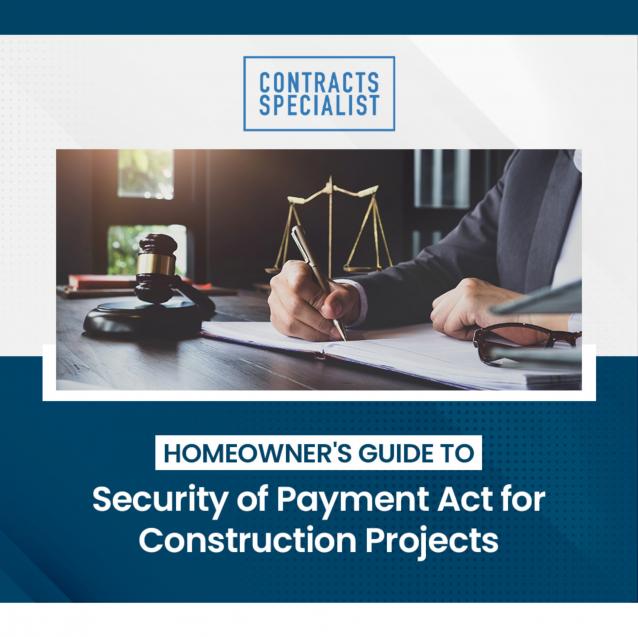
Contract Variations
By Contracts Specialist|June 08, 2022
The changes that a contractor may need to make are called "variations." These can include various things such as adding more workers on-site or changing some detail about what needs done.
The variations in a contract can be instructed by either the client or proposed by the contractor. These are to be agreed upon between all parties involved, so as not conflict with each other's interests
Causes of Variations
When the construction of a building is not completed because unforeseen circumstances arise, there can be many variations. These changes in plans may include delays that occur during its progress or even an increase in size for some reason such as adding extra rooms to your home without prior notice so watch out.
Situation #1: You would need to request your contractor to do additional work because you realized that the house may need another window.
Situation #2: You have seen that some of the tasks that your contractors have are overlapping and decide to change it to suit their designated tasks more.
Situation #3: You decided to change the quality of your paint that you would use for a paint job as a change of preference.
Situation #4: There have been changes in the project site such as sudden temperature changes that led to cost adjustments.
Situation #5: The everchanging costs of construction materials which affect the prices stated in the contract.
Types of Variations
As a homeowner, you can request for a variation to your builder for any of these reasons:
The sooner you deal with any potential problems, the less hassle and stress they'll cause for yourself during construction.
The Process of Documenting a Variation
You can submit variation orders through writing a letter to your builder. Make sure that you include all of the necessary information, including what changes need to be made and how much it will cost if any additional work needs done.
Checking the variation clause in your contract before making a proposal is important. In order for both parties to have agreed and signed off on any changes, they must be signed from each side. This formalises the changes and makes them binding.
Why should you immediately make a Variation Claim
Double checking your contract's variation clause could save you from potential problems. What matters is that both parties agreed to it and signed off on proposed changes, making their version of the agreement legally binding.
If you’re a homeowner, the important thing to do when you're planning your new home is to let the builder know about any sudden changes in design or plans. Document everything properly, and make sure that if there are deadlines for completing certain tasks, they will be met.
Need help in making Variation Claims?
If you are unsure about whether variations are necessary, or if you want to know how to make a certain variation in your construction contract, don't hesitate to contact our team for help. We'll review the terms of both parties' agreements and determine if it is appropriate time-wise as well as legally feasible before making any decisions.
You are sure to find expert legal advice on variations, whatever the situation you're facing. We can help ensure that your house turns into your dream home.
Want to discuss your next construction project? Our team is ready and waiting for you. First consult is free.
The variations in a contract can be instructed by either the client or proposed by the contractor. These are to be agreed upon between all parties involved, so as not conflict with each other's interests
Causes of Variations
When the construction of a building is not completed because unforeseen circumstances arise, there can be many variations. These changes in plans may include delays that occur during its progress or even an increase in size for some reason such as adding extra rooms to your home without prior notice so watch out.
Situation #1: You would need to request your contractor to do additional work because you realized that the house may need another window.
Situation #2: You have seen that some of the tasks that your contractors have are overlapping and decide to change it to suit their designated tasks more.
Situation #3: You decided to change the quality of your paint that you would use for a paint job as a change of preference.
Situation #4: There have been changes in the project site such as sudden temperature changes that led to cost adjustments.
Situation #5: The everchanging costs of construction materials which affect the prices stated in the contract.
Types of Variations
As a homeowner, you can request for a variation to your builder for any of these reasons:
- Change in the quantity of work;
- Change in the quality of work;
- Change in the costs for the work to be done;
- Change on how to do the work and;
- Change in the latent condition and risk allocation of the construction project.
The sooner you deal with any potential problems, the less hassle and stress they'll cause for yourself during construction.
The Process of Documenting a Variation
You can submit variation orders through writing a letter to your builder. Make sure that you include all of the necessary information, including what changes need to be made and how much it will cost if any additional work needs done.
Checking the variation clause in your contract before making a proposal is important. In order for both parties to have agreed and signed off on any changes, they must be signed from each side. This formalises the changes and makes them binding.
Why should you immediately make a Variation Claim
Double checking your contract's variation clause could save you from potential problems. What matters is that both parties agreed to it and signed off on proposed changes, making their version of the agreement legally binding.
If you’re a homeowner, the important thing to do when you're planning your new home is to let the builder know about any sudden changes in design or plans. Document everything properly, and make sure that if there are deadlines for completing certain tasks, they will be met.
Need help in making Variation Claims?
If you are unsure about whether variations are necessary, or if you want to know how to make a certain variation in your construction contract, don't hesitate to contact our team for help. We'll review the terms of both parties' agreements and determine if it is appropriate time-wise as well as legally feasible before making any decisions.
You are sure to find expert legal advice on variations, whatever the situation you're facing. We can help ensure that your house turns into your dream home.
Want to discuss your next construction project? Our team is ready and waiting for you. First consult is free.



